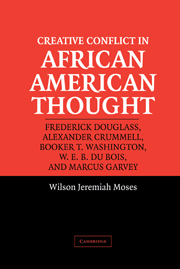Book contents
- Frontmatter
- Contents
- Acknowledgments
- Preface: Struggle, Challenge, and History
- 1 Introduction: Reality and Contradiction
- FREDERICK DOUGLASS: THE INDIVIDUALIST AS RACE MAN
- ALEXANDER CRUMMELL: THE ANGLOPHILE AS AFROCENTRIST
- BOOKER TALIAFERO WASHINGTON: THE IDEALIST AS MATERIALIST
- 8 Booker T. Washington and the Meanings of Progress
- 9 Protestant Ethic versus Conspicuous Consumption
- W. E. B. DU BOIS: THE DEMOCRAT AS AUTHORITARIAN
- MARCUS MOZIAH GARVEY: THE REALIST AS ROMANTIC
- CONCLUSION: RESCUING HEROES FROM THEIR ADMIRERS
- Index
8 - Booker T. Washington and the Meanings of Progress
Published online by Cambridge University Press: 07 November 2009
- Frontmatter
- Contents
- Acknowledgments
- Preface: Struggle, Challenge, and History
- 1 Introduction: Reality and Contradiction
- FREDERICK DOUGLASS: THE INDIVIDUALIST AS RACE MAN
- ALEXANDER CRUMMELL: THE ANGLOPHILE AS AFROCENTRIST
- BOOKER TALIAFERO WASHINGTON: THE IDEALIST AS MATERIALIST
- 8 Booker T. Washington and the Meanings of Progress
- 9 Protestant Ethic versus Conspicuous Consumption
- W. E. B. DU BOIS: THE DEMOCRAT AS AUTHORITARIAN
- MARCUS MOZIAH GARVEY: THE REALIST AS ROMANTIC
- CONCLUSION: RESCUING HEROES FROM THEIR ADMIRERS
- Index
Summary
What oldest star the fame can save
Of races perishing to pave
The planet with a floor of lime?
Dust is their pyramid and mole:
Who saw what ferns and palms were pressed
Under the tumbling mountain's breast,
In the safe herbal of the coal …
But when the quarried means were piled,
All is waste and worthless, till
Arrives the wise selecting will,
And, out of slime and chaos, Wit
Draws the threads of fair and fit.
Then temples rose, and towns, and marts,
The shop of toil, the hall of arts;
Then flew the sail across the seas
To feed the North from tropic trees;
The storm-wind wove, the torrent span,
Where they were bid, the rivers ran;
New slaves fulfilled the poet's dream,
Galvanic wire, strong-shouldered steam. …
Ralph Waldo Emerson, in the above lines, outlined a seemingly conventional version of the meaning of “Progress,” based on Charles Lyell's historical geology, and dynamic applications of other sciences, on economic and industrial frontiers. The underlying metaphysic of the poem was one of constant change, represented by exploration, invention, and cycles of boom and bust. Overwhelmingly pervasive attitudes of commercial exuberance and industrial euphoria prepared Emerson and his contemporaries to think of progresss and change as normal conditions of the universe. Emerson was born during the presidency of Thomas Jefferson, whose contrasting metaphysic defined progress very differently, as movement toward a more perfect understanding of self-evident and stable truths – the unalterable laws of nature and nature's God.
- Type
- Chapter
- Information
- Creative Conflict in African American Thought , pp. 141 - 165Publisher: Cambridge University PressPrint publication year: 2004



